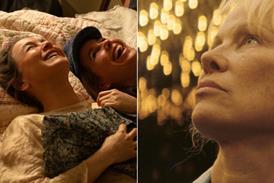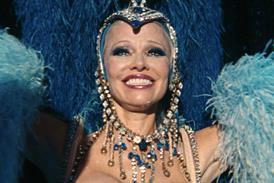Dir: Kim Ki-duk. Korea-Japan. 2008. 93mins.

Kim Ki-duk’s recent urban films have only been as good as their high-concept premises. The premise behind Dream is reasonably interesting - better than Breath though not up there with 3-Iron. But the writer-director doesn’t quite know how to wrap this dark, humour-tinged tale about a couple of good-looking strangers who discover they are linked by her appearance in his dreams. Although Kim is a master at using music, lighting, costume and art direction to evoke atmosphere, the increasingly frantic story structure and the lack of character development begin to grate well before the end.
The main problem for distributors is that the arthouse audience cachet associated with Kim’s name has been fading with every film since 3-Iron in 2004; and though it’s not a bad example of his oeuvre, Dream is no brand-reviver. Results are likely to be similar to Time, which surfaced in 19 territories outside its homebase (3- Iron had notched up 32), mostly in ultra-limited release, and mostly to uninspiring takings.
The one exception could be the co-production territory of Japan, where audiences will respond to the presence of local star Joe Odagiri in one of the two lead roles (though they may be disoriented by the fact that Odagiri speaks Japanese and all the other characters answer him in Korean - part of Kim’s ongoing fascination with verbal communication). As for South Korea itself, it’s been years since the director’s films have registered more than a blip on the box-office monitor there - and if 3-Iron didn’t manage it, it’s difficult to see Dream pulling off the coup.
The fast-paced opening has traditional woodblock printmaker Jin (Odagiri) waking in a cold sweat from a nightmare in which he caused a traffic accident. Driving to the spot he saw in the dream, he is horrified to discover that an accident really did take place. But it wasn’t Jin’s car that was caught on the CCTV footage; it was that of bolshy fashion designer Ran (Korean star Lee Na-young) whose sleepwalking problem has escalated to take in nocturnal drives. Jin soon discovers that Ran acts out what he dreams at night which generally involves Ran’s visits to her ex-boyfriend (Kim), though Jin’s ex-girlfriend (Park) also appears in the dreams, sometimes as the ex-boyfriend’s new lover.
Suspecting that his dreams are going to force Ran to do something terrible, Jin moves into her apartment and the two make a pact to sleep in shifts (she can’t sleepwalk when she’s awake). Jin’s stratagems to keep himself awake are funny at first but become increasingly difficult to watch as he begins to mutilate himself with his printer’s tools. Meanwhile, Rin, Jan and their two exes begin to swap places as the line between dream and reality is blurred. This would be more fascinating if it were better thought through; as it is, the plotting is muddy, and the script’s bizarre leaps of logic are presented without explanation.
In the end, Dream works more as a twisted rom-com than a ‘dream-or-reality” psychothriller: there’s sparky chemistry between Lee and Odagiri which should have been expoited more in the story. As usual with Kim, the sets (especially Jin’s home printing studio) are a visual delight.
Production companies
Sponge
Style Jam Inc
Dongyu Club
International sales
Showbox/Mediaplex Inc
(82) 2 3218 5649
Producers
Kim Ki-duk
Song Myung-chul
David Cho
Kai Naoki
Kunizane Mizue
Screenplay
Kim Ki-duk
Cinematography
Kim Gi-tae
Editor
Kim Ki-duk
Music
Park Ji
Main cast
Joe Odagiri
Lee Na-young
Kim Tae-hyun
Park Ji-ah






















No comments yet